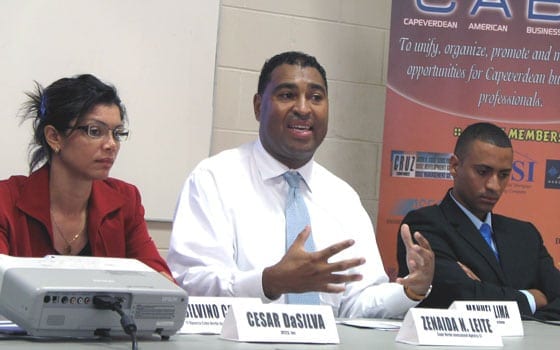
Ever since Armindo Gonçalves left the Cape Verde islands in 1979, he says he’s had a desire to give back to the archipelago nation where he spent much of his childhood.
After 10 years working as a planner for the Boston Redevelopment Authority, Gonçalves has begun to do just that, helping businesses and government officials structure development deals in Cape Verde’s rapidly expanding economy.
It’s a labor of love in a place where Gonçalves knows he has to do good and do well.
“We’re all vested in Cape Verde,” Gonçalves says. “If I go to Cape Verde and do something wrong, everyone will know about it. My parents are there.”
Gonçalves last Saturday joined other Cape Verdean-American investors, business owners and Cape Verdean government officials for a panel discussion about business opportunities in the West African island nation. The discussion took place during Mostra Cabo Verde, a convention held at the Reggie Lewis Track and Athletic Center.
In the 33 years since Cape Verde won its independence from Portugal, its economy has transitioned from state-controlled to free market. Although lacking in natural resources and subject to periodic droughts, the islands have become a destination for European tourists.
Tourism, and the growing clout of members of the Cape Verdean diaspora in the U.S. and Europe (now estimated at more than 600,000 people), have increased land values and led to a development boom in the country. Boston-area entrepreneurs like developer John Cruz III and architect Cesar DaSilva are getting in on the action, bringing needed expertise and capital.
“Right now is the best time to get into real estate in Cape Verde,” said Dee Rodrigues, a real estate agent who sells properties in both Massachusetts and Cape Verde. “Here, the market is down 30 percent. There, it’s up 30 percent.”
Cape Verde’s phenomenal growth and the resulting investment opportunities were key topics at Mostra, which drew several hundred people.
The floor of the Tremont Street field house was packed with display booths showcasing businesses, nonprofits and cultural groups from Cape Verde and the Cape Verdean population in New England. Each row of booths was named for one of the Cape Verdean archipelago’s nine main islands.
Rodrigues manned a booth for the Cape Verdean American Business Organization (CABO), an organization founded by local business entrepreneurs to help boost both local businesses and Cape Verde-based businesses and to encourage investment.
“A lot of Europeans are investing,” Rodrigues says. “What we’re saying is Cape Verdean Americans should be investing.”
CABO was founded after Boston-area Cape Verdeans approached the nation’s prime minister, José Maria Neves, and asked him about opportunities for investment on the island.
“He advised us to start a chamber of commerce in Massachusetts,” said DaSilva, who works on construction projects in Massachusetts and Cape Verde.
State Rep. Vinny deMacedo, R-Plymouth, who was born on the island of Brava but grew up in Massachusetts, went to Cape Verde with a delegation of state representatives earlier this year.
“Cape Verde has grown by leaps and bounds economically,” he said. “For individuals looking for emerging markets, Cape Verde is strategically placed. It’s open to Africa, Europe and the United States. It’s worked hard to create close bonds with other countries.”
Even the formerly Marxist-leaning African Party for the Independence of Cape Verde, or PAICV, has embraced neoliberal economic policies that encourage investment.
“Individuals feel very confident in the government,” deMacedo said. “It’s transparent. They feel their investments are safe in Cape Verde.”
While the development boom in Cape Verde is fueled largely by tourism and the increasing economic power of its expatriate population, the islands are also seeing an increase in other business growth, thanks in part to the $110 million Millennium Challenge grant Cape Verde was awarded by the U.S. government in 2004.
The grant, aimed at economic development, has ratcheted up interest in Cape Verdean business development.
With the growth has come the challenges typically associated with developing nations. In panel discussions, Cape Verdean entrepreneurs discussed the advantages and disadvantages of tariffs and foreign ownership. Tourism has brought foreign exchange to Cape Verde, but has also placed some choice spots out of the average Cape Verdean citizen’s reach.
Verissimo Pinto directs the Bolsa de Valores de Cabo Verde, the Cape Verdean stock exchange. He said the government is using the Millennium Challenge grant to help Cape Verdean businesses step up to the challenges posed by foreign competition.
“We’ve started a business incubation project,” he said. “We take small businesses that have potential for growth and build them up for a year until we open the market up to competition.
“We don’t think we should open our businesses overnight and have them overtaken by competition.”







